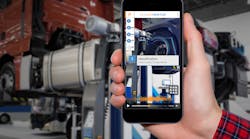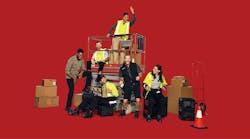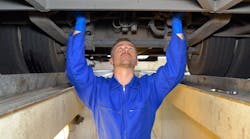As the trucking industry works to attract and retain talent, companies have been working to determine how to recruit the next generation of technicians.
Through the use of virtual reality (VR) and augmented reality (AR) systems, companies like Design Industries have worked to provide interactive and engaging training methods.
Matt Johnston, Division Head, Commercial Solutions, for Design Interactive; and Ken Calhoun, Fleet Optimization Manager for Altec Industries, shared insights on this topic during a training session titled Augmented Reality for Maintenance, at the American Trucking Associations' Management Conference Expo 2019 this week.
VR and AR require the use of a specially designed headset or goggles. VR creates a fully simulated environment that places the user inside of the experience where they can interact in a three-dimensional environment. AR supplements an existing environment, through the use of a smartphone or camera. For example, the user would point their smartphone at the area, and additional videos or holograms could be built into the viewing screen, where the user can interact via the touchscreen.
Design Industries has developed a means for experts in the field to develop augmented reality (AR) training programs, through its Augmentor augmented reality product, which can be shared among fleets, suppliers, OEMs, and training schools.
Augmentor from Design Interactive also features a web portal for creating, editing, and distributing training modules to Android and iOS mobile devices and HoloLens headsets. With immediate access to updated content, the solution can be deployed quickly and effectively across multiple locations.
This platform allows experts to develop training programs and share their knowledge by making it accessible to others through a web-based library of different training processes and procedures.
Currently, development for AR training programs is more cost-effective, and takes less time, compared to VR training programs, says Johnston.
According to Johnston, AR is a potential solution because it can help decrease waste through an increased first-time fixed-rate and reduced repeat repairs as well as find information faster; decrease cost because fleets no longer must pay for travel costs, and they can reuse the training content. It also improves industry attractiveness by providing young talent a means to experience the industry in a format they’re familiar with through video game technology.
One example of an AR training program would be how to teach technicians methods for proper tire analysis. There are 13 types of tire wear, which require hands-on training because two-dimensional imaging does not provide a comprehensive view of the tire issue. Traditionally, physical tires were required as part of the training – requiring either travel costs of the trainee to a training facility or the cost of shipping the tires to a location for training.
With an AR program, the physical tires would be replaced with holograms of virtual tires.
Young technicians are familiar with and using VR and AR now, and there is value in using this technology to inspire and educate them about this industry, says Johnston. Ultimately, he says, this method of training could amount to flexibility with training available any time and anywhere, and the investment to modernize can result in long-term cost savings.
An interactive, mobile workshop initiative
Building on the development of VR and AR training, the Arkansas Trucking Association has spearheaded a project called Be Pro Be Proud (BeProBeProud.org) with industry representatives to introduce skilled trades to students through the use of VR and AR training programs. The program is carried out through a mobile workshop that travels to different educational facilities and provides students the ability to try out different processes involved in the trade industry.
Introduced in 2016, the original trailer featured six interactive stations where students could interact with various pieces of equipment representing different industries. In September, the organization introduced an upgraded 53' trailer with pullouts replacing the original training unit, with more space, as well as updated and new training stations. The new trailer features 12 interactive stations, including a commercial truck simulator, a lineman simulator, an excavator simulator, a welding station, and more. The updated truck and trailer will be on display at the Technology & Maintenance Council's Annual Meeting, February 24-27, 2020 in Atlanta.




